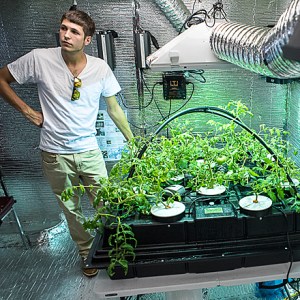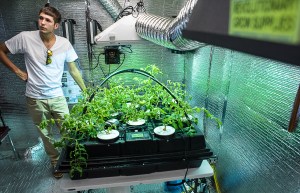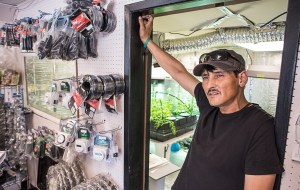AUBURN — The way Alex “Scott” Strother describes it, growing marijuana outdoors is a hassle.
Lugging dirt, guarding your stash.
Ditto for the hassle of the space taken up growing traditionally inside — a vegging room, a budding room, a cloning room.
“Between these huge light bills and these huge nutrient bills and all this stuff, they’re realizing that they’re not making so much money. Most (growers) are in a very bad mood,” said Strother, 45.
Strother has, in pitchman style, the answer: He’s invented and patented a new aeroponic deep-water growing unit, the centerpiece of his son’s new Minot Avenue store, Revolutionary Grow Supplies.
It opened in mid-July. They’re already ahead of sales projections and are set to open a second shop and a production factory on outer Lisbon Street in Lewiston next month.
So far, 90 percent of customers, Strother said, are registered medical marijuana caregivers growing for themselves and others. Industrial units cost about $3,000 and he claims they yield up to 15 pounds of marijuana every two months.
For the garden-variety tomato grower, units run about $1,000. He and Alex Strother Jr., 25, say they’re eager to grow the veggie side of the business.
“It’s helping everybody, not just ourselves,” the younger Strother said. “We’re helping everybody in the state of Maine first and then it’s going to spread like wildfire across the whole country to get people to grow their own food again.”
The pair had talked about opening a shop together for years. Alex Strother Jr., who lives in Sabattus, said he sold his Utz potato chip delivery route for startup capital. Both have been medical marijuana caregivers in the past and Alex Strother Sr. of Harrison said he’s also a medical marijuana patient.
“We’ve been playing around with tons of different grows, in every different way, so Alex has seen this pretty much all of his life, me growing,” Strother Sr. said. “We needed to find the money in it without growing weed and selling it illegally. We wanted to find the money in a legal way, that’s why the machine has come into play.”
The machine, called the Root to Fruit, comes in three sizes with four, six or 12 6-inch-deep basins dropped into a black plastic housing. Each plant grows in its own basin and the entire unit sits over its own water reservoir. Vegetable growers add 25 to 30 gallons of water every 20 days before draining off 5 to 8 gallons, harvesting, adding more water and starting over again.
Carrots, onions, corn, tomatoes, green beans, peppers and watermelons can grow in each basin. Alex Strother Sr. said it’s a way to grow vegetables with one-quarter of the nutrients in half the time and an eighth of the space, adding about $25 to the monthly electric bill.
He plans to set up a series of units in different stages at the Auburn shop. It’s not the hydroponics that people are used to, he said.
“They’ve had little machines for years that would do herbs; they haven’t got much bigger than that,” he said. “(They were) just too small a basin and all the roots grow together. People have tried to do this and they have a real bad taste in their mouth about trying to do it, they almost just threw it in the closet and went down to the grocery store.”
He maintains that bigger is worth a try. A tiered, 4- by 8-foot unit can replace several rooms worth of growing process for a medical marijuana grower, Strother said.
They hope to make thousands of units a year at the new factory space at 70 Lisbon St. and are aiming for up to 20 employees by the end of 2016.
“I think you’ll find in the next two to three years a lot of people will be converting to the easier methods, less nutrients, go green, just use a lot less of everything,” Strother said.



Comments are no longer available on this story